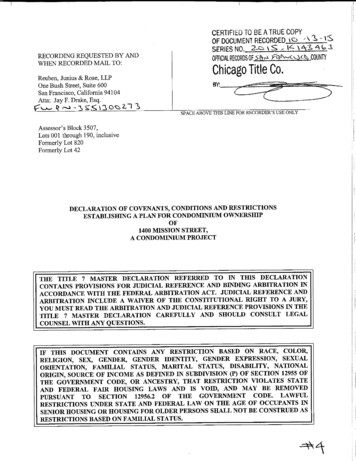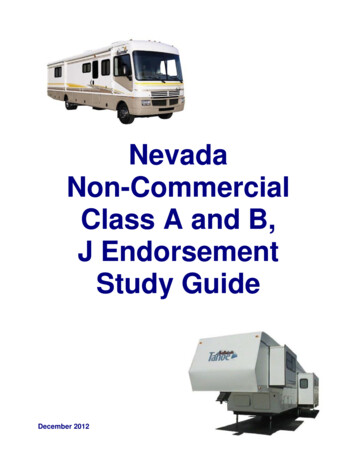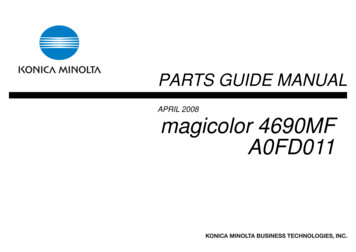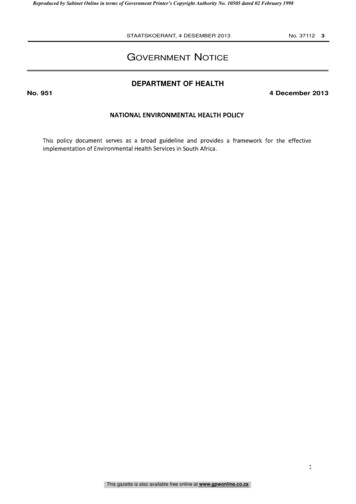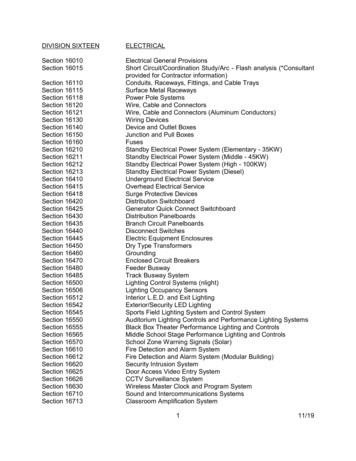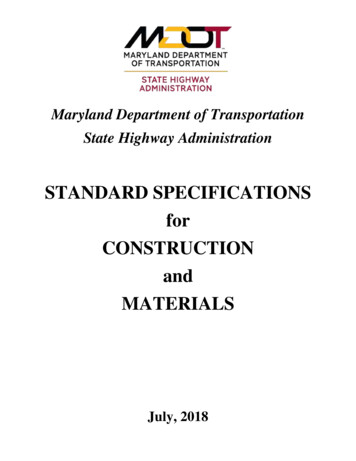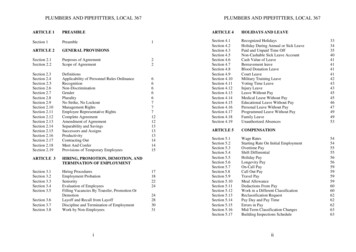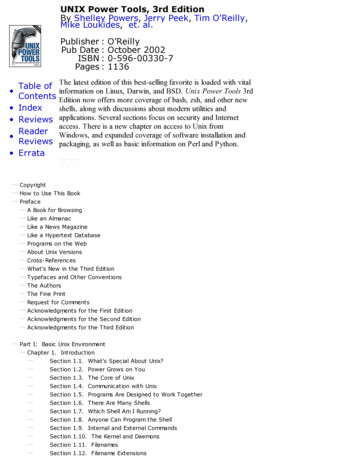
Transcription
CONSTITUTION OF THE UNITED STATES-'1WE THE PEOPLEof the United States, in Order to form a moreperfect Union, establish Justice, insure domestic Tranquility,provide for the common defence, promote the general Welfare, and secure the Blesiings of Liberty to ourselves and ourPosterity, do ordain and establish this Constitution for theUnited States of America.I1!SECTION1. All legislative Powers herein granted shall be vestedin a congress of the United States, which shall consist of aSenate and House of Representatives.-1I:,,i,;:i!i(II;II:IIThis text of the Constitution follows the engrossed copy signed by Gen. Washington and thedeputies from 12 States. The small superior figures preceding t h e paragraphs designate clauses.and were not in the original and have no reference to footnotes.The Constitution was adopted by a convention of .the States on September 17. 1787. and wassubsequently ratified by t h e several States. on the following dates: Delaware. December 7. 1787:Pennsylvania. December 12. 1787; New,Jersey. December 18. 1787; Georgia, January 2, 1788; Connecticut. January 9. 1788: Massachusetts. February 6. 1788: Maryland. April 28. 1788; South Caro.lina. May 23. 1788: New Hampshire. June 21. 1788.Ratification was completed on June 21. 1788.The Constitution was subsequently ratified by Virginia. June 25. 1788; New York. July 26. 1788;North Carolina. November 21. 1789; Rhode Island. May 29. 1790: and Vermont. January 10. 1791.In May 1785. a committee of Congress made a report recommending an alteration in the Articlesof Confederation. but no action was taken on it. and it was left to the State Legislatures to proceed in t h e matter. In January 1786. the Legislature of Virginia passed a resolution providing fort h e appointment of five commissioners. who. or any three of them. should meet such commissioners as might be appointed in the other States of the Union. a t a time and place to be agreed upon.to take into consideration the trade of the United States; to consider how far a uniform system intheir commercial regulations may be necessary to their common interest and their permanentharmony; and to report to the several States such an act. relative to this great object,as, whenratified by them. will enable the United States in Congress effectually t o provide for the same.T h e Virginia commissioners. after some correspondence. fixed the first Monday in September ast h e time, and t h e city of Annapolis as the place for the meeting, but only four other States wererepresented, viz: Delaware. New York. New Jersey. and Pennsylvania: the commissioners appointed by Massachusetts. New Hampshire. North Carolina. and Rhode Island failed to attend. Undert h e circumstances of so partial a representation. the commissioners present agreed upon a report,(drawn by Mr. Hamilton. of New York.) expressing their unanimous conviction that it might essentially tend to advance the interests of the Union if the States by which they were respectivelydelegated would concur. and use their endeavors t o procure t h e concurrence of the other States.in the appointment of commissioners to meet a t Philadelphia on the Second Monday of May following. to take into consideration the situation of the United States: to devise such further pmvislons as should appear to them necessary to render the Constitution of the Federal Governmentadequate t o the exigencies of the Union: and to report such an act for that purpose to the UnitedStates in Congress assembled as. when agreed to by them and afterwards confirmed by the Legislatures of every State. would effectually provide for the same.Congress. on t h e 21st of February, 1787, adopted a resolution in favor of a convention, and theLegislatures of those States which had not already done so (with the exception of Rhode Island)promptly appointed delegates. On the 25th of May. seven States having convened. George Washington. of Virginia. was unanimously elected President. and the consideration of the proposedconstitution was commenced. On the 17th of September. 1787. t h e Constitution as engrossed andagreed upon was signed by all the members present. except Mr. Gerry of Massachusetts. andMessrs. Mason and Randolph. of Virginia. The president of the convention transmitted it to Congress. with a resolution stating how the proposed Federal Government should be put in operation.and a n explanatory letter. Congress, on the 28th of September. 1787, directed the Constitution soframed, with the resolutions and letter concerning the same. to "be transmitted to the several(1)-'
- 2.-CONSTITUTION OF THE UNITED STATES.-.-.t. .SECTION.2. The House af Representatives shall be composedof Members chosen every second Year by the People of the.sever,-- -. a1 States, and-tk?e Electors hi each State shall have the Qualifications *quisite for .Electors of the most numerous Branch of theState' Legislature. NO Persqn shall be. a Representative whd shall hot have attained to the Age of twenty five Years, and been seven Years aCitizen of the United States, and who shall not, when elected, bean Inhabitant of that State in which he shall be chosen.Representatives and direct Taxes shall be apportioned amongthe several States which may be included withi71 this Union, according to their respective Numbers, which shall be determined !by adding to the whole Number of free Persons, including thosebound to Service for a Term of Years, and excluding Indians nottaxed, three fifths of all other Persons2 The actual Enumerationshall be made within three Years after the first Meeting of theCongress of the United States, and within every subsequentTerm of ten Years, in such Manner as they shall by Law direct.The Number of Representatives shall not exceed one for everythirty Thousand, but each State shall have at Least one Representative; and until such enumeration shall be made, the State ofNew Hampshire shall be entitled to chuse three, Massachusettseight, Rhode-Island and Providence Plantations one, Connecticutfive, New-York six, New Jersey four, Pennsylvania eight, Delaware one, Maryland six, Virginia ten, North Carolina five, SouthCarolina five, and Georgia three.When vacancies happen in the Representation from anyState, the Executive Authority thereof shall issue Writs of Election to fill such Vacancies.The House of Representatives shall chuse their Speaker andother Officers; and shall have the sole Power of Impeachment.SECTION.3. The Senate of the United States shall be composed of two Senators from each State, chosen by the Legislaturethereof.3 for six Years; and each Senator shall have one Vote.Immediately after they shall be assembled in Consequence ofthe first Election, they shall be divided a s equally as may be intothree Classes. The Seats of the Senators of the first Class shallbe vacated at the Expiration of the second Year, of the secondClass at the Expiration of the fourth Year, and of the third Classat the Expiration of the sixth Year, so that one third may bechosen every second Year; and if Vacancies happen by ResignaLegislatures in order t o be submitted to a convention of delegates chosen in each State by thepeople thereof. in conformity to the resolves of the convention."On the 4th of March. 1789. the day which had been fixed for commencing the operations ofGovernment under the new Constitution. it had been ratified by the conventions chosen in eachState to consider it, as follows: Delaware. December 7. 1787: Pennsylvania. December 12. 1787;New Jersey. December 18. 1787: Georgia. January 2. 1788: Connecticut. January 9. 1788: Massachusetts. February 6. 1788: Maryland. April 28. 1788: South Carolina. May 23. 1788: New Hampshire. June 21. 1788; Virginia. June 25. 1788: and New York. July 26. 1788.The President informed Congress. on the 28th of January, 1790. that North Carolina had ratified the Constitution November 21. 1789; and he informed Congress on the 1st of June. 1790. thatRhode Island had ratified the Constitution May 29. 1790. Vermont. in convention. ratified theConstitution January 10. 1791. and was. by an act of Congress approved February 18. 1791. "received and admitted into this Unjon as a new and entire member of the United States."ZThe part of this clause relatlng to the mode of apportionment of representatives among theseveral States has been affected by section 2 of amendment XIV, and as to taxes on incomes without apportionment by amendment XVI.'This clause has been affected by clause 1 of amendment XVII. .3tion, or otherwise,, during the Recess of the Legislature of anyState,the E.&ecutivethereof may make temporary Appointments'until the next Meeting qf the Legislhture, which shall then fill. '. such Vacan ies. NO Person shall be a Senator who shall hot have'attainedctothe Age of thirty Years, and been nine- Years a Citizen of the United States, and who shall not, when elected, be an Inhabitantof that State for which he shall be chosen.The Vice President of the United States shall bedpresidentofthe Senate, but shall have no Vote, unless they be equally divided.,also a PresiThe Senate shall chuse their other f i i c e r sanddent pro tempore, in the Absence of the Vice President, or whenhe shall exercise the Office of President of the United States. The Senate shall have the sole Power to try all Impeachments. When sitting for that Purpose, they shall be on Oath orAffirmation. When the President of the United States is tried,the Chief Justice shall preside; And no Person shall be convictedwithout the Concurrence of two thirds of the Members present.Judgment in Cases of Impeachment shall not extend furtherthan to removal from Office, and disqualification to hold andenjoy any Office of honor, Trust or Profit under the UnitedStates: but the Party convicted shall nevertheless be liable andsubject to Indictment, Trial, Judgment and Punishment, according to Law.SECTION.4. 'The Times, Places and Manner of holding Elections for Senators and Representatives, shall be prescribed ineach State by the Legislature thereof; but the Congress may atany time by Law make or alter such Regulations, except as to thePlaces of chusing Senators.The Congress shall assemble at least once in every Year. and, such Meeting shall be on the first Monday in D e e m b e r unlessthey shall by Law appoint a different Day.SECTION.5. Each House shall be the Judge of the Elections,Returns and Qualifications of its own Members, and a Majorityof each shall constitute a Quorum to do Business; but a smallerNumber may adjourn from day to day, and may be authorized tocompel the Attendance of absent Members, in such Manner, andunder such Penalties as each House may provide.*Each House may determine the Rules of its Proceedings,punish its Members for disorderly Behaviour, and, with the Concurrence of two thirds, expel a Member.Each House shall keep a Journal of its Proceedings, and fromtime to time publish the same, excepting such Parts as may intheir Judgment require Secrecy; and the Yeas and Nays of theMembers of either House on any question shall, a t the Desire ofone fifth of those Present, be entered on the Journal.4 Neither House, during the Session of Congress, shall, withoutthe Consent of the other, adjourn for more than three days, norto any other Place than that in which the two Houses shall besitting.-.*CO STITUTIONOF THE UNITED STATES.This clause has been affected by clause 2 of amendment XVIII. Thisclause has been affected by amendment XX.
4.CONSTITUTION OF THE UNITED STATES.SECTIDN.6. The Senators and Representatives shall regive aCompensati nfor their Services, to be ascertained by Law, andpaid out of the Treasury of the United States.6 They shall ih all*- Casb, ezcept Treason, Felony and Breach of the Peace, be privileged from Arrest during their Attendance at the Sessiandf theirresp'ectivi: Houses, and in going to and returning from the h e ;and for any Speech or Debate in either House, they shall not bequestioned in any other Place.No Senator or Representative shall, during the Time forwhich he was elected, be appointed to any civil Office under theAuthority of the United States, which shall have been created, or,the Emoluments whereof shall have been encreased during suchtime; and no Person holding any Office under the United States,shall be a Member of either House during his Continuance inOffice.SECTION.7. All Bilk for raising Revenue shall originate in theHouse of Representatives; but the Senate may propose or concurwith Amendments as on other Bills.Every Bill which shall have passed the House of Representatives and the Senate, shall, before it become a Law, be presentedto the President of the United States; If he approve he shall signit, but if not he shall return it, with his Objections to that Housein which it shall have originated, who shall enter the Objectionsat large on their Journal, and proceed to reconsider it. If aftersuch Reconsideration two thirds of that House shall agree topass the Bill, it shall be sent, together with the Objections, tothe other House, by which it shall likewise be reconsidered, andif approved by two thirds of that House, it shall become a Law.But in all such Cases the Votes of both Houses shall be determined by yeas and Nays, and the Names of the Persons votingfor and against the Bill shall be entered on the Journal of eachHouse respectively. If any Bill shall not be returned by the President within ten Days (Sundays excepted) after it shall have beenpresented to him, the Same shall be a Law, in like Manner as ifhe had signed it, unless the Congress by their Adjournment prevent its Return, in which Case it shall not be a Law.3 Every Order, Resolution, or Vote to which the Concurrence ofthe Senate and House of Representatives may be necessary(except on a question of Adjournment) shall be presented to thePresident of the United States; and before the Same shall takeEffect, shall be approved by him, or being disapproved by him,shall be repassed by two thirds of the Senate and House of Representatives, according to the Rules and Limitations prescribedin the Case of a Bill.SECTION.8. The Congress shall have Power To lay and collectTaxes, Duties, Imposts and Excises, to pay the Debts and providefor the common Defence and general Welfare of the UnitedStates; but all Duties, Imposts and Excises shall be uniformthroughout the United States;2 TOborrow Money on the credit of the United States;3 TOregulate Commerce with foreign Nations, and among theseveral States, and with the Indian Tribes;.-I-:.-);.2".CONSTITUTION OF THE UNITED STATES'I5?To establish an uniform Rule oP Naturalization, and uniform'Laws 'on the .subject of Bankrutjcies throughout the UnitedStates;, .To coin Money, tegulde the Value thereof, and of foreignCoin, and fix the Standard of Weights and Measures;To provide for the Punishment of counterfeiting the Securities and current Coin of the United States;To establish Post Offices and post Roads;TOpromote the Progress of Science and useful Arts, by securing for limited Times to Authors and Inventors the exclusiveRight to their respective Writings and Discoveries;TOconstitute Tribunals inferior to the supreme Court;l o To define and punish Piracies and Felonies committed on thehigh Seas, and Offences against the Law of Nations;l 1 To declare War, grant Letters of Marque and Reprisal, andmake Rules concerning Captures on Land and Water;l 2 TOraise and support Armies, but no Appropriation of Moneyto that Use shall be for a longer Term than two Years;l 3 TOprovide and maintain a Navy;14To make Rules for the Government and Regulation of theland and naval Forces;l 5 TO provide for calling forth the Militia to execute the Lawsof the Union, suppress Insurrections and repel Invasions;'6 TOprovide for organizing, arming, and disciplining, the Militia, and for governing such Part of them as may be employed inthe Service of the United States, reserving to the States respectively, the Appointment of the Officers, and the Authority oftraining the Militia according to the discipline prescribed byCongress;l 7 To exercise exclusive Legislation in all Cases whatsoever,over such District (not exceeding ten Miles square) as may, byCession of particular States, and the Acceptance of Congress,become the Seat of the Government of the United States, and toexercise like Authority over all Places purchased by the Consentof the Legislature of the State in which the Same shall be, forthe Erection of Forts, Magazines, Arsenals, dock-Yards, andother needful Buildings;-Andl 8 TOmake all Laws which shall be necessary and proper forcarrying into Execution the foregoing Powers, and all otherPowers vested by this Constitution in the Government of theUnited States, or in any Department or Officer thereof.SECTION.9. The Migration or Importation of such Persons asany of the States now existing shall think proper to admit, shallnot be prohibited by the Congress prior to the Year one thousand eight hundred and eight, but a Tax or duty may be imposedon such Importation, not exceeding ten dollars for each Person.2 The Privilege of the Writ of Habeas Corpus shall not be suspended, unless when in Cases of Rebellion or Invasion the publicSafety may require it.3 NO Bill of Attainder or ex post facto Law shall be passed.4No Capitation, or other direct, Tax shall be laid, unless inProportion to the Census or Enumeration herein before directedto be taken.?9''6This clause has been affected by amendment XXVII.This clause hss been affected by amendment XVI.
6ICO-NSTITUTION OF THE UNITEDSTATESNo Tax or Duty shall be laid on Articles exported from anyState.NO Preference, shall be given by any Regulation of Commerceor Revenue .to the,PortA of one State over those of another: norshall Vessqls bound to, dr from, one State, be obliged to enter,. clear, or pay Duties in another.:NO Money shall be drawn from the Treasury. but in Consequence of Appropriations made by Law; and a regular Statementand Account of the Receipts and Expenditures of all publicMoney shall be published from time to time.8 N Title of Nobility shall be granted by the United States:And no Person holding any Office of Profit or Trust under them,shall, without the Consent of the Congress, accept of anypresent, Emolument, Office, or Title, of any kind whatever, fromany King, Prince, or foreign State.SECTION.10. NO State shall enter into any Treaty, Alliance, orConfederation; grant Letters of Marque and Reprisal; coinMoney; emit Bills of Credit; make any Thing but gold and silverCoin a Tender in Payment of Debts; pass any Bill of Attainder,ex post facto Law, or Law impairing the Obligation of Contracts,or grant any Title of Nobility.NO State shall, without the Consent of the Congress, lay anyImposts or Duties on Imports or Exports, except what may be absolutely necessary for executing it's inspection Laws: and the netProduce of all Duties and Imposts, laid by any State on Importsor Exports, shall be for the Use of the Treasury of the UnitedStates; and all such Laws shall be subject to the Revision andControul of the Congress.NO State shall, without the Consent of Congress, lay anyDuty of Tonnage, keep Troops, or Ships of War in time of Peace,enter into any Agreement or Compact with another State, orwith a foreign Power, or engage in War, unless actually invaded,or in such imminent Danger as will not admit of delay.*-SECTION.1. The executive Power shall be vested in a Presidentof the United States of America. He shall hold his Office duringthe Term of four Years, and, together with the Vice President,chosen for the same Term, be elected, as followsEach State shall appoint, in such Manner as the Legislaturethereof may direct, a Number of Electors, equal to the wholeNumber of Senators and Representatives to which the State maybe entitled in the Congress: but no Senator or Representative, orPerson holding an Office of Trust or Profit under the UnitedStates, shall be appointed an Elector.3 The Electors shall meet in their respective States, and vote byBallot for two Persons, of whom one a t least shall not be an Inhabitant of the same State with themselves. And they shall makea List of all the Persons voted for, and of the Number of Votesfor each; which List they shall sign and certify, and transmitsealed to the Seat of the Government of the United States, directed to the President of the Senate. The President of theSenate shall, in the Presence of the Senate and House of Repre-II.IICONSTITUTION O F T H E U N I T P STATES7. sentatives, open all the Certificates, and the votes shall then be.becounted. The Person having the greatest Number of Votes shallthe President, if -such Ihmber .be a Majority lDf the wh e*'.'. .Number of- Electors .appointed; and if there .be more 'tha'n onewho have such Majority, and have aq equal Number of Votes.then the House of Representatives shall immediately chuse byBallot one of them for President; and if no Person have a Majority, then from the five highest on the List the said House shall inlike Manner chuse the President. But in chusing the President,the Votes shall be taken by States, the Representation from eachState having one Vote; A quorum for this Purpose shall consistof a Member or Members from two thirds of the States, and aMajority of all the States shall be necessary to a Choice. In everyCase, after the Choice of the President, the Person having thegreatest Number of Votes of the Electors shall be the Vice President. But if there should remain two or more who have equalVotes, the Senate shall chuse from them by Ballot the VicePre ident. *The Congress may determine the Time of chusing the Electors, and the Day on which they shall give their Votes; whichDay shall be the same throughout the United States.No Person except a natural born Citizen, or a Citizen of theUnited States, a t the time of the Adoption of this Constitution,shall be eligible to the Office of President; neither shall anyPerson be eligible to that Office who shall not have attained tothe Age of thirty five Years, and been fourteen Years a Residentwithin the United States.In Case of the Removal of the President from Office, or of hisDeath, Resignation, or Inability to discharge the Powers and, Same shall devolve on the ViceDuties of the said O f f i ethePresident, and the Congress may by Law provide for the Case ofRemoval, Death, Resignation or Inability, both of the Presidentand Vice President, declaring what Officer shall then act asPresident, and such Officer shall act accordingly, until the Disability be removed, or a President shall be elected.The President shall, at stated Times, receive for his Services,a Compensation, which shall neither be encreased nor diminished during the Period for which he shall have been elected,and he shall not receive within that Period any other Emolument from the United States, or any of them.8 Before he enter on the Execution of his Office, he shall takethe following Oath or Affirmation:-"I do solemnly swear (oraffirm) that I will faithfully execute the Office of President ofthe United States, and will to the best of my Ability, preserve,protect and defend the Constitution of the United States."SECTION.2. The President shall be Commander in Chief of theArmy and Navy of the United States, and of the Militia of theseveral States, when called into the actual Service of the UnitedStates; he may require the Opinion, in writing, of the principalOfficer in each of the executive Departments, upon any Subjectrelating to the Duties of their respective Offices, and he shall*This clause has been superseded by amendment XII.Thk clause has been affected by amendment XXV.9,
I8.iCONSTITUTION O F THE UNITED STATEShave power to q a n t R.eprieves and Pardons for Offences againstthe Uiiited States,"except in Cases of Impeachment.He shall have Power, by and with.the Advice and Consent ofthe Senate, to make Treaties, provided tWo thirds of :the Sendtorspresent concu.r;.and he,shall nominate, and'by and with th'e.Advice and Consent of .theasenate, shall appoint Ambassadors,other public Ministers zind Consuls, Judges of the supremeCourt, and all other Officers of the United States, whose Ap-.pointments are not herein otherwise provided for, and whichshall be established by Law: but the Congress may by Law vestthe Appointment of such inferior Officers, as they think prober,in the President alone, in the Courts of Law, or in the Heads ofDepartments.The President shall have Power to fill up all Vacancies thatmay happen during the Recess of the Senate, by granting Commissions which shall expire a t the End of their next Session.SECTION.3. He shall from time to time give to the Congress Information of the State of the Union, and recommend to theirConsideration such Measures as he shall judge necessary and expedient; he may, on extraordinary Occasions, convene bothHouses, or either of them, and in Case of Disagreement betweenthem, with Respect to the Time of Adjournment, he may adjourn them to such Time as he shall think proper; he shall receive Ambassadors and other public Ministers; he shall take Carethat the Laws be faithfully executed, and shall Commission allthe Officers of the United States.SECTION.4. The President, Vice President and all civil Officersof the United States, shall be removed from Office on Impeachment for, and Conviction of, Treason, Bribery, or other highCrimes and Misdemeanors.SECTION.1. The judicial Power of the United States, shall bevested in one supreme Court, and in such inferior Courts as theCongress may from time to time ordain and establish. TheJudges, both of the supreme and inferior Courts, shall hold theirOffices during good Behaviour, and shall, at stated Times, receive for their Services, a Compensation, which shall not be diminished during their Continuance in Office.SECTION.2. The judicial Power shall extend to all Cases, inLaw and Equity, arising under this Constitution, the Laws of theUnited States, and Treaties made, or which shall be made, undertheir Authority;-to all Cases affecting Ambassadors, otherpublic Ministers and Consuls;-to all Cases of admiralty and maritime Jurisdiction;-to Controversies to which the United Statesshall be a Party;-to Controversies between two or more States;between a State and Citizens of another State; lo-between Citizens of different States,-between Citizens of the same Stateclaiming Lands under Grants of different States, and between aState, or the Citizens thereof, and foreign States, Citizens orSubjects.-Iii!lII!Ii-I1I.has been affected by amendment XI.9ARTICLE.IV.SECTION.1. Full Faith and Credit shall be given in each State tothe public Acts, Records, and judicial Proceedings of every otherState. And the Congress may by general Laws prescribe theManner in which such Acts, Records and Proceedings shall beproved, and the Effect thereof.SECTION.2. The Citizens of each State shall be entitled to allPrivileges and Immunities of Citizens in the several States.A Person charged in any State with Treason, Felony, or otherCrime, who shall flee from Justice, and be found in anotherState, shall on Demand of the executive Authority of the Statefrom which he fled, be delivered up, to be removed to the Statehaving Jurisdiction of the Crime.NO Person held to Service or Labour in one State, under theLaws thereof, escaping into another, shall, in Consequence ofany Law or Regulation therein, be discharged from such Serviceor Labour, but shall be delivered up on Claim of the Party towhom such Service or Labour may be due.SECTION.3. New States may be admitted by the Congress intothis Union; but no new State shall be formed or erected withinthe Jurisdiction of any other State; nor any State be formed bythe Junction of two or more States, or Parts of States, withoutthe Consent of the Legislatures of the States concerned as wellas of the Congress.The Congress shall have Power to dispose of and make allneedful Rules and Regulations respecting the Territory or otherProperty belonging to the United States; and nothing in thisConstitution shall be so construed as to Prejudice any Claims ofthe United States, or of any particular State.---lo This clause-.I n all Cases affecting mbassadors, other public Ministersand Consuls, and those in which a State shall be Party, -tHe supreme court shall havC original. Jufisdiction. In a11 .the other.-. Cases before mentioned, the supreme Court shall have appellate . , Jurisdiction, both as to.Law and Fact, with such Exceptions, andunder such Regulations ai the Congress shall make.3 T h e Trial of all Crimes, except in Cases of Impeachment,shall be by Jury; and such Trial shall be held in the State wherethe said Crimes shall have been committed; but when not committed within any State, the Trial shall be a t such Place orPlaces as the Congress may by Law have directed.SECTION.3. Treason against the United States, shall consistonly in levying War against them, or in adhering to their Enemies, giving them Aid and. Comfort. No Person shall be convicted of Treason unless on the Testimony of two Witnesses to thesame overt Act, or on Confession in open Court.The Congress shall have Power to declare the Punishment ofTreason, but no Attainder of Treason shall work Corruption ofBlood, or Forfeiture except during the Life of the Personattainted.IiCONSTITUTION O F T H E UNITED STATESIL This clause has been affected by amendment XIII.
10.ICONSTITUTION OF THESECTION.4. The United States shall guarantee to every State inthis .Union a Republican F o r q of Government, and .shall proteoteach'of them against Invasion; and on Application of the Legisla- ,ture, or 'of the Executive (when the Legislature cannot be convened) against domestic Violence.The Congress, whenever two thirds of both Houses shall dbemit necessary. shall propose Amendments to this Constitution, or,on the Application of the Legislatures of two thirds of the severa1 States, shall call a Convention for proposing Amendments,which, in either Case, shall be valid to all Intents and Purposes,as
CONSTITUTION OF THE UNITED STATES-' 1 WE THE PEOPLE of the United States, in Order to form a more perfect Union, establish Justice, insure domestic Tranquility, provide for the common defence, promote the general Wel- fare, and secure the Blesiings of Liberty to ourselves and our Posterity, do ordain
